pep英语六年级下册知识点归纳汇总
【口袋书】人教版PEP六年级下册英语 基础知识汇总
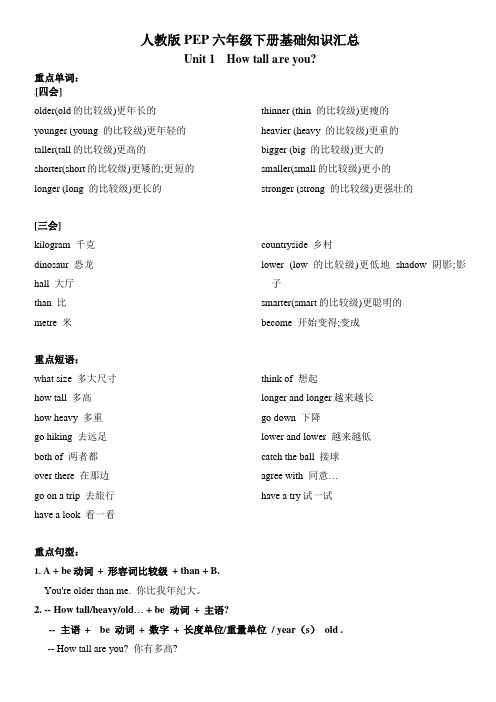
人教版PEP六年级下册基础知识汇总Unit 1 How tall are you?重点单词:[四会]older(old的比较级)更年长的younger (young 的比较级)更年轻的taller(tall的比较级)更高的shorter(short的比较级)更矮的;更短的longer (long 的比较级)更长的thinner (thin 的比较级)更瘦的heavier (heavy 的比较级)更重的bigger (big 的比较级)更大的smaller(small的比较级)更小的stronger (strong 的比较级)更强壮的[三会]kilogram 千克dinosaur 恐龙hall 大厅than 比metre 米countryside 乡村lower (low 的比较级)更低地shadow 阴影;影子smarter(smart的比较级)更聪明的become 开始变得;变成重点短语:what size 多大尺寸how tall 多高how heavy 多重go hiking 去远足both of 两者都over there 在那边go on a trip 去旅行have a look 看一看think of 想起longer and longer越来越长go down 下降lower and lower 越来越低catch the ball 接球agree with 同意…have a try试一试重点句型:1.A + be动词+ 形容词比较级+ than + B.You're older than me. 你比我年纪大。
2. -- How tall/heavy/old… + be 动词+ 主语?-- 主语+ be 动词+ 数字+ 长度单位/重量单位/ year(s)old .-- How tall are you? 你有多高?-- I'm 1. 65 metres. 我身高1. 65米。
人教pep版六年级下册英语全册重要知识点总结

人教pep版六年级下册第一单元单元重要知识点总结四会单词:tall—taller更高的short—shorter 更矮的strong—stronger更强壮的small—smaller (体型)更小的old—older 年龄更大的young—younger 更年轻的big—bigger更大的heavy—heavier 更重的long—longer 更长的thin—thinner 更瘦的四会句型:How tall are you? 你有多高?I’m 164 cm tall. 我164 厘米高。
You’re shorter than me. 你比我矮。
You’re 4 cm taller than me.你比我高4厘米。
How heavy are you? 你有多重?I’m 48 kg. 我48千克。
应该掌握的知识点:1.表示两者之间有所比较时,句子中的形容词要用比较级形式。
形容词变为比较级的变化规则:(1)一般情况下,在形容词的词尾直接加er。
如: tall—taller short—shorter.(2)以字母e结尾的形容词,在词尾直接加r,如:nice—nicer late—later(3)以重读闭音节结尾,且结尾只有一个辅音字母的词,先双写这个辅音字母,再加er.如:big—bigger thin—thinner fat—fatter(4)以辅音字母加y结尾的双音节形容词,先变y为i , 再加er。
如:easy—easierheavy—heavier funny—funnier.形容词比较级的变化口诀:原级变为比较级,通常er加上去。
若是结尾辅元辅,辅音双写要牢记。
辅音加y结尾时,把y变i 是必须。
原级若以e结尾,直接加r不后悔。
2.部分形容词比较级的不规则变化:good—better well—better bad—worsebadly—worse many—more much—more little—less far—farther3.同义句:How tall are you?=What’s your height?How heavy are you?=What’s your weight?4.以How开头的问句(仅限小学阶段):How are you? 问身体状况。
Unit 2 Last weekend 知识点(知识清单)人教PEP版英语六年级下册

小学英语人教PEP 版六年级下册Unit 2 Last weekend 知识点清单一、词汇1.动词短语及活动相关◆clean my room:打扫房间是日常家务之一,能让房间保持整洁。
例如:I usually clean my room on weekends to make it look nice.(我通常在周末打扫我的房间以使它看起来漂亮。
)◆wash my clothes:洗衣服是生活中必备的事情。
比如:My mothertaught me how to wash my clothes last weekend.(我妈妈上周末教我如何洗衣服。
)◆stay at home:有时我们会选择待在家里休息或做一些室内活动。
像:It was raining heavily last weekend, so I had to stay at home.(上周末雨下得很大,所以我不得不待在家里。
)◆watch TV:看电视是常见的休闲方式,可以观看各种节目。
例如:I like to watch TV in the evening. Last weekend, I watched adocumentary about animals.(我喜欢在晚上看电视。
上周末,我看了一部关于动物的纪录片。
)◆read a book:读书能增长知识和丰富想象力。
例如:I often read abook before going to sleep. Last weekend, I read a novel and reallyenjoyed it.(我经常在睡觉前读书。
上周末,我读了一本小说并且非常喜欢它。
)◆see a film:看电影是一种很好的娱乐活动,可以在电影院享受大屏幕的视觉体验。
例如:My friends and I went to see a film last weekend.It was a comedy and made us laugh a lot.(我和我的朋友们上周末去看了一部电影。
pep六年级英语下册知识点总结
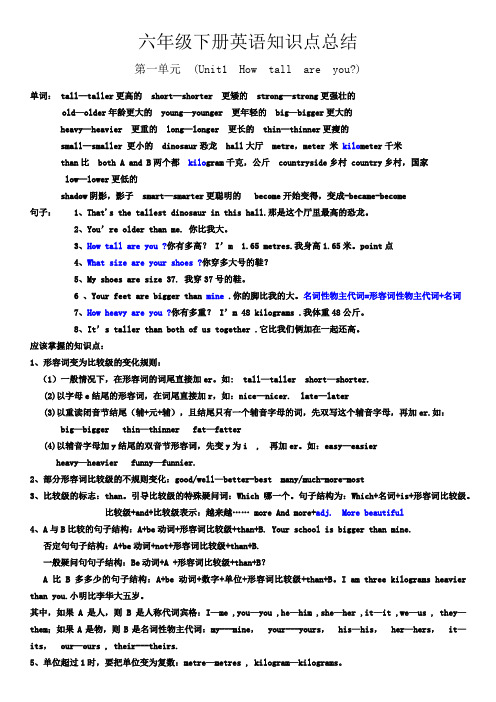
六年级下册英语知识点总结第一单元(Unit1 How tall are you?)单词: tall—taller更高的short—shorter 更矮的strong—strong更强壮的old—older年龄更大的young—younger 更年轻的big—bigger更大的heavy—heavier 更重的long—longer 更长的thin—thinner更瘦的small—smaller 更小的 dinosaur恐龙 hall大厅 metre,meter 米kilo meter千米than比 both A and B两个都 kilo gram千克,公斤 countryside乡村 country乡村,国家low—lower更低的shadow阴影,影子 smart—smarter更聪明的 become开始变得,变成-became-become句子: 1、That's the tallest dinosaur in this hall.那是这个厅里最高的恐龙。
2、You’re older than me. 你比我大。
3、How tall are you ?你有多高? I’m 1.65 metres.我身高1.65米。
point点4、What size are your shoes ?你穿多大号的鞋?5、My shoes are size 37. 我穿37号的鞋。
6 、Your feet are bigger than mine .你的脚比我的大。
名词性物主代词=形容词性物主代词+名词7、How heavy are you ?你有多重? I’m 48 kilograms .我体重48公斤。
8、It’s taller than both of us together .它比我们俩加在一起还高。
应该掌握的知识点:1、形容词变为比较级的变化规则:(1)一般情况下,在形容词的词尾直接加er。
如: tall—taller short—shorter.(2)以字母e结尾的形容词,在词尾直接加r,如:nice—nicer. late—later(3)以重读闭音节结尾(辅+元+辅),且结尾只有一个辅音字母的词,先双写这个辅音字母,再加er.如:big—bigger thin—thinner fat—fatter(4)以辅音字母加y结尾的双音节形容词,先变y为i , 再加er。
pep六年级下册英语知识点归纳总结

pep六年级下册英语知识点归纳总结一、单词拼写常见规律:1. 以e结尾的单词,变成复数形式时,先去掉e再加s;2. 以辅音字母+y结尾的单词,变成复数形式时,先把y变i再加es;3. 以o结尾的单词,变复数形式时,大部分直接加es。
二、基数词和序数词1. 基数词:表示数量的词,例如:one, two, three等;2. 序数词:表示顺序的词,例如:first, second, third等。
三、时态1. 一般现在时:表示经常发生的动作或客观事实;2. 一般过去时:表示过去发生的动作或状态;3. 一般将来时:表示将来发生的动作或计划。
四、句型结构1. 肯定句结构:主语+动词+宾语;2. 否定句结构:主语+do/does/did not+动词+宾语;3. 疑问句结构:特殊疑问词/助动词+主语+动词+宾语。
五、情态动词常见情态动词有can, could, may, might, must, shall, should, will, would等,它们用于表示推测、能力、许可、建议、命令等情态。
六、名词所有格1. 名词所有格:表示所属关系的名词后面加's;2. 表示复数名词所有格:在复数名词后面加';3. 表示以s结尾的复数名词所有格:在复数名词后面加'。
七、形容词和副词1. 形容词:修饰名词,通常放在名词前面;2. 副词:修饰动词、形容词和副词,通常放在所修饰的词后面。
八、比较级和最高级1. 比较级:表示两个或两组人或事物之间的比较,形容词和副词的比较级一般在词尾加er,例如:taller, faster;2. 最高级:表示三个或三组或三者以上的人或事物之间的比较,形容词和副词的最高级一般在词尾加est,例如:tallest, fastest。
九、倍数和分数1. 倍数:使用倍数词+as+形容词原级,例如:twice as heavy as;2. 分数:使用分数词+of+名词,例如:two-thirds of the students。
人教PEP版英语六年级下册Unit 1-4知识点总结(期末复习)
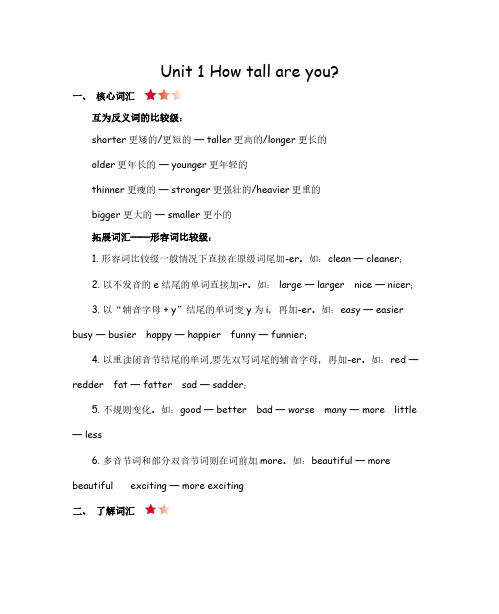
Unit1How tall are you?一、核心词汇互为反义词的比较级:shorter更矮的/更短的—taller更高的/longer更长的older更年长的—younger更年轻的thinner更瘦的—stronger更强壮的/heavier更重的bigger更大的—smaller更小的拓展词汇——形容词比较级:1.形容词比较级一般情况下直接在原级词尾加-er。
如:clean—cleaner;2.以不发音的e结尾的单词直接加-r。
如:large—larger nice—nicer;3.以“辅音字母+y”结尾的单词变y为i,再加-er。
如:easy—easier busy—busier happy—happier funny—funnier;4.以重读闭音节结尾的单词,要先双写词尾的辅音字母,再加-er。
如:red—redder fat—fatter sad—sadder;5.不规则变化。
如:good—better bad—worse many—more little —less6.多音节词和部分双音节词则在词前加more。
如:beautiful—more beautiful exciting—more exciting二、了解词汇dinosaur恐龙hall大厅metre米(美式英语:meter)than比both两个都kilogram千克;公斤countryside乡村lower(low的比较级)更低地shadow阴影;影子smarter(smart的比较级)更聪明的become开始变得;变成三、核心句型1.—How tall are you?你有多高?—I’m1.64metres.我身高1.64米。
2.—What size are your shoes,Mike?迈克,你穿多大号的鞋?—Size7.7号。
3.—How heavy are you?你体重多少?—I’m48kilograms.我体重48公斤。
PEP英语六年级下册Unit2语法归纳
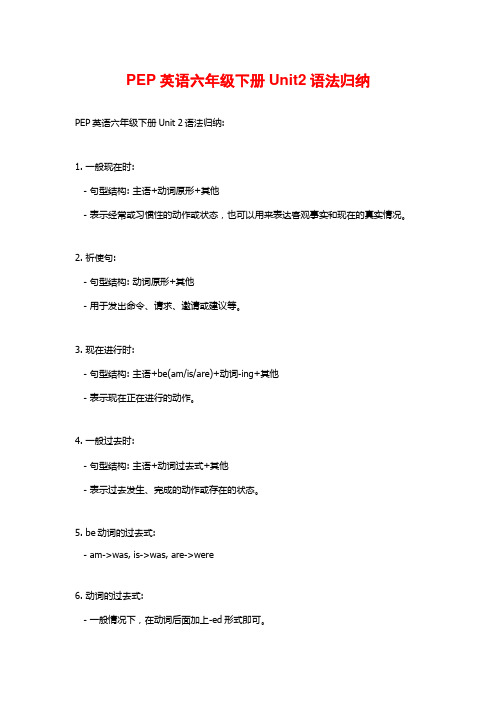
PEP英语六年级下册Unit2语法归纳
PEP英语六年级下册Unit 2语法归纳:
1. 一般现在时:
- 句型结构: 主语+动词原形+其他
- 表示经常或习惯性的动作或状态,也可以用来表达客观事实和现在的真实情况。
2. 祈使句:
- 句型结构: 动词原形+其他
- 用于发出命令、请求、邀请或建议等。
3. 现在进行时:
- 句型结构: 主语+be(am/is/are)+动词-ing+其他
- 表示现在正在进行的动作。
4. 一般过去时:
- 句型结构: 主语+动词过去式+其他
- 表示过去发生、完成的动作或存在的状态。
5. be动词的过去式:
- am->was, is->was, are->were
6. 动词的过去式:
- 一般情况下,在动词后面加上-ed形式即可。
7. 带有情态动词的英语句子:
- 情态动词可以用来表示说话人对某种动作或状态的评价、推测、建议等。
8. 比较级和最高级:
- 比较级用于比较两者之间的程度或数量,最高级则表示三者或三者以上的程度或数量的最高。
9. 数词:
- 用来表示具体的数量。
10. 及物动词和不及物动词:
- 及物动词后面必须加上宾语来完成意思,而不及物动词在意思上已经完整。
这些是PEP英语六年级下册Unit 2的一些语法要点,希望对你有帮助!。
(完整版)PEP小学英语六年级下册词汇句子汇总
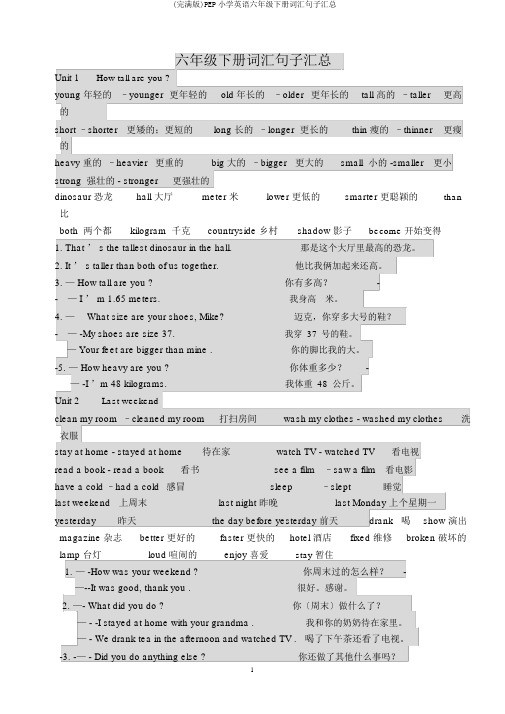
六年级下册词汇句子汇总Unit 1How tall are you ?young 年轻的–younger更年轻的old 年长的–older更年长的tall 高的–taller更高的short –shorter更矮的;更短的long 长的–longer 更长的thin 瘦的–thinner更瘦的heavy 重的–heavier更重的big 大的–bigger更大的small 小的 -smaller更小strong 强壮的 - stronger更强壮的dinosaur 恐龙hall 大厅meter 米lower 更低的smarter 更聪颖的than 比both 两个都kilogram 千克countryside 乡村shadow 影子become 开始变得1. That ’ s the tallest dinosaur in the hall.那是这个大厅里最高的恐龙。
2. It ’ s taller than both of us together.他比我俩加起来还高。
3. — How tall are you ?你有多高?-- — I ’ m 1.65 meters.我身高米。
4. —What size are your shoes, Mike?迈克,你穿多大号的鞋?- — -My shoes are size 37.我穿37号的鞋。
— Your feet are bigger than mine .你的脚比我的大。
-5. — How heavy are you ?你体重多少?-— -I ’m 48 kilograms.我体重48公斤。
Unit 2Last weekendclean my room –cleaned my room打扫房间wash my clothes - washed my clothes洗衣服stay at home - stayed at home待在家watch TV - watched TV看电视read a book - read a book看书see a film–saw a film看电影have a cold –had a cold感冒sleep–slept睡觉last weekend上周末last night 昨晚last Monday 上个星期一yesterday昨天the day before yesterday 前天drank喝show 演出magazine 杂志better 更好的faster 更快的hotel 酒店fixed 维修broken 破坏的lamp 台灯loud 喧闹的enjoy 喜爱stay 暂住1. — -How was your weekend ?你周末过的怎么样?-—--It was good, thank you .很好。
- 1、下载文档前请自行甄别文档内容的完整性,平台不提供额外的编辑、内容补充、找答案等附加服务。
- 2、"仅部分预览"的文档,不可在线预览部分如存在完整性等问题,可反馈申请退款(可完整预览的文档不适用该条件!)。
- 3、如文档侵犯您的权益,请联系客服反馈,我们会尽快为您处理(人工客服工作时间:9:00-18:30)。
人教版pep六年级英语下册知识点汇总Unit 1 How tall are you?【重点词汇】tall------ taller 高的----更高的short ------ shorter 矮的/短的----更矮的/更短的long----- longer 长的----更长的strong------ stronger 强壮的----更强壮的old ------ older 老的/旧的----更老的/更旧的young------ younger 年轻的----更年轻的small------ small 小的----更小的heavy------heavier 重点----更重的thin ------ thinner 瘦的----更瘦的low------ lower 低地----更低地smart------smarter 聪明的----更聪明的big-----bigger 大的-----更大的happy-----happier 开心的-----更开心的thin-----thinner 瘦的-----更瘦的heavy-----heavier 重的------更重的fat-----fatter 胖的------更胖的funny-----funnier 滑稽的------更滑稽的dinosaur 恐龙hall 大厅than 比both 两个都meter 米kilogram千克;公斤size 号码feet 脚wear 穿countryside乡村shadow 影子;阴影become变成;开始变得【重点句型】⑴问年龄:How old are you? ----- I’m _______ (years old).问身高:How tall are you? ---- I’m ______meters tall.问题中:How heavy are you? ---- I’m ______ kilograms .⑵问物品的情况:①How large is your room? 你的房间有多大?It’s __________ m2 (square meters.) 有_______ 平方米。
②How long is your bed? 你的床有多长?It’s _________cm long. 有______厘米长。
③How big are your feet? (= What size are your shoes?) 你的脚有多长?I wear size ______.(= My shoes are size________.) 我穿_______码的鞋。
⑶形容谁比谁更……①主语+ be am/ is/ are/ ( even/much ) …er than …如:I am taller than you. 我比你高。
I am 4 cm taller than your brother. 我比你弟弟高4cm .I am taller and stronger than your brother. 我比你的弟弟更高更壮。
Jack is even stronger than his father. 甚至比他爸爸还壮。
Zhang Peng and John are much younger than Mr.Green. 张鹏和John 比Mr. Green 要年轻多了。
其它句型:1. That’s the tallest dinosaur in this hall. 那是这个厅里最高的恐龙。
2. It’s taller than both of us together. 它比我俩加起来还高。
3. Your feet are bigger than mine. 你的脚比我的大。
4. There are more dinosaurs over there. 那儿有更多的恐龙。
5. Who is taller than you? 谁比你高?Unit 2 Last weekend【重点词汇】clean---cleaned my room 打扫我的房间wash ---washed my clothes 洗我的衣服stay---stayed at home 待在家里watch---watched TV 看电视read---read a book 看书drink---drank tea喝茶 have---had a cold感冒 see---saw a film看电影 sleep---slept 睡觉last Monday上个星期一last weekend 上个周末last night昨晚yesterday evening昨晚yesterday昨天the day before yesterday前天【其它词汇】cook--cooked the food visit--visited my grandparents play--played footballstudy--studied English do ---did something else go---went boating make---made the bedsshow演出magazine 杂志better更好的(good,well的比较级) faster(更快的)hotel(旅馆) fixed(修理)broken(破损的)lamp (台灯)loud(喧闹的,大声的) enjoy(享受…乐趣,喜爱) stay(暂住,逗留)【重点句型】1. ---How was your weekend? ---It was good, thank you. 你周末过得怎么样?很好,谢谢。
2. ---What did you do? 你(周末)干什么?--I stayed at home with your grandma. We drank tea in the afternoon and watched TV.我和你奶奶待在家里。
我们喝了下午茶,还看了电视。
3. ---Did you do anything else? 你还做了其他什么事吗?---Yes, I cleaned my room and washed my clothes. 是的,我打扫了房间,还洗了衣服。
4. I want to buy the new film magazine. 我想买期新的电影杂志。
5. --- What did you do last weekend? Did you see a film? 你上周末干什么?你看电影了吗?--- No, I had a cold. I stayed at home all weekend and slept. 没有,我感冒了。
整个周末都待在家里睡觉。
Unit 3 Where did you go?【重点词汇】go fishing--- went fishing 去钓鱼go camping --- went camping 去野营go swimming--- went swimming 去游泳ride a bike--- rode a bike 骑自行车ride a horse--- rode a horse 骑马hurt my foot--- hurt my foot 我的脚受伤take pictures--- took pictures 照相buy gifts--- bought gifts 买礼物eat fresh food--- ate fresh food 吃新鲜的食物fall off---fell off 从…摔倒licked (lick的过去式)舔could (can的过去式)能及其过去式laughed(laugh的过去式)笑【重点语法】▶一般疑问句,把did提前—Did you help your parents clean the room ? ( 当句子变为一般疑问句,动词应还原)—Yes , I did ./No, I didn’t .▶特殊疑问句: 疑问词+did+主语+V原形+其它?1. —Where did you go on your holiday? 假期你去了哪里?—I went to Xinjiang. 我去了新疆.2. —What did you do on your holiday?你假期干了什么?—I sang and danced. 我即唱了歌又跳了舞.3. —How did you go there? 你怎样去的?—I went by train. 我坐火车去的.4.—When did you go? 你什么时候去的? —I went last Monday. 我上周一去的.【重点句型】1. --- What happened ? --I fell off my bike and hurt my foot. 怎么了?我从自行车上摔下来了,并且弄伤了我的脚。
2. ---Are you all right? ---I’m OK now. 你还好吧?现在没事了。
3. Where did you go over the winter holiday? 在寒假期间你去了哪儿?4. It looks like a mule. 它看起来像头骡子。
5. ---Did you go to Turpan? ---Yes, we did. 你们去过吐鲁番了吗?是的,去了。
6. ---Hainan is far from here. How did you go there? 海南离这儿很远。
你们怎么去的?---We went there by plane. 我们坐飞机去那儿的。
7. Sounds great! Can I see your pictures sometime? 听上去不错!改天我能看看你的照片吗?8. Come and look at my photos from the Labour Day holiday. 来看我劳动节假期的照片。
9. ---Who did you go with? ---My parents and my uncle. 你和谁一起去的?我父母和我叔叔。
10. I saw lots of grapes and ate lots of mutton kebabs. 我看见了许多葡萄,吃了许多烤羊肉串。
11.---How was the beach? ---It was beautiful. 沙滩怎么样?它很美。
12.Max sat in a basket on the front of the bike. 马克斯坐在自行车前面的(车)筐里。
13.We took pictures of the beautiful countryside. 我们拍了美丽乡村的照片。
